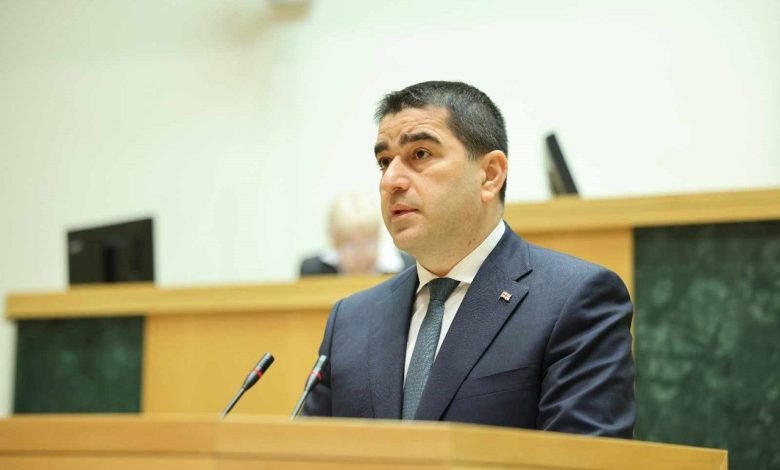
Speaker Papuashvili Denounces Criticism for Discrediting Journalists
In a lengthy letter posted on social media on March 20, Parliament Speaker Shalva Papuashvili accused the Georgian Media Advocacy Coalition, a local press freedom watchdog, of “celebrating” the fact that European organizations had commented on the “discrediting of a prominent Georgian journalist”. Papuashvili lamented the Media Freedom Rapid Response partners’ assessment that his comments on journalist Gela Mtivlishvili came “amid a broader wave of smear campaigns against independent media in Georgia”.
Papuashvili’s letter is a response to the statement issued by Media Freedom Rapid Response (MFRR) partner organizations. In the statement, the media organizations condemned the cases of attacks on the media, including the discrediting campaigns against and pressure on journalists in Georgia, including by the Speaker.
Papuashvili repeats criticism of journalist Mtivlishvili for his journalistic work, particularly his coverage of the tragic landslide in Shovi last year, saying he had spread “unverified information” and misled society. The Speaker slams Mtivlishvili for blaming the Government for failing to avert the landslide and the deaths, including by failing to have a well-functioning early warning system. Papuashvili mentions an “independent Swiss organization” which, he says, recently investigated the disaster and agreed with the main conclusion of the State Environmental Agency, on the basis of which “Mtivlishvili’s allegations were indeed misleading”.
He claims that Mtivlishvili’s reporting “did not fit journalistic standards and was far from human empathy.” Moreover, according to Papuashvili, Mtivlishvili’s reporting aimed at “spreading panic.”
Criticizing Mtivlishvili for “spreading disinformation”, Speaker Papuashvili then notes “that not a single journalistic organization has tried to establish the truth, before defending Mtivlishvili due to “corporate solidarity”.
Complaining that “not a single journalistic organization attempted to establish the truth before defending Mtivlishvili” due to the alleged “corporate solidarity” Papuashvili writes that this case “illustrates a significant malaise characteristic of Georgian ‘critical’ journalism and their foreign partners” whereby “any criticism and accusations, leveled by the media against the government, must be accepted at its face value, but also recognized as perfectly legitimate and true by the very fact that they are reported by journalists.”
Papuashvili complains that “any expression of doubt… from the government officials”, and repeating by a government official of his or her counter-criticism, “becomes a ‘systemic pressure’ against the media”.
Parliament Speaker argues that “criticism of journalists must be accepted as part of normal debate within a democratic society.” He slams “overzealous foreign partners,” which, according to him “seem to be so anxious to ‘expose’ violations of press freedom that they take every criticism of the media, even if justified, as a ‘public discreditation’ of a particular journalist or a media outlet.”
“Georgia is a safe country for journalists but this should not mean they are free to spread disinformation. Every time they allow inaccuracies, they will be criticized. And this is normal,” Papuashvili concludes.
Also Read:
- 31/01/2024 – Journalist Detained During Kekelidze Eviction Standoff Fined
- 20/01/2024 – Speaker Lashes out at Tolerance Center, SovLab, CSOs, USAID Over Stalin’s Image in Church
- 25/05/2023 – Ethics Charter: Threat to “Mtis Ambebi” Editor Requires Timely Investigation
This post is also available in: ქართული Русский